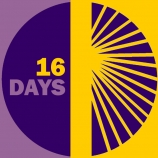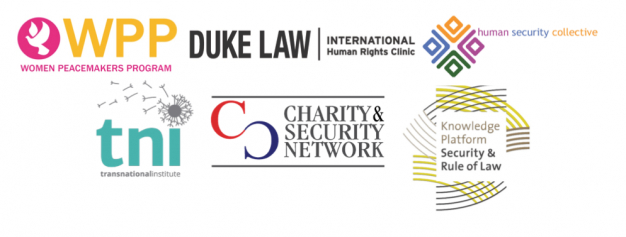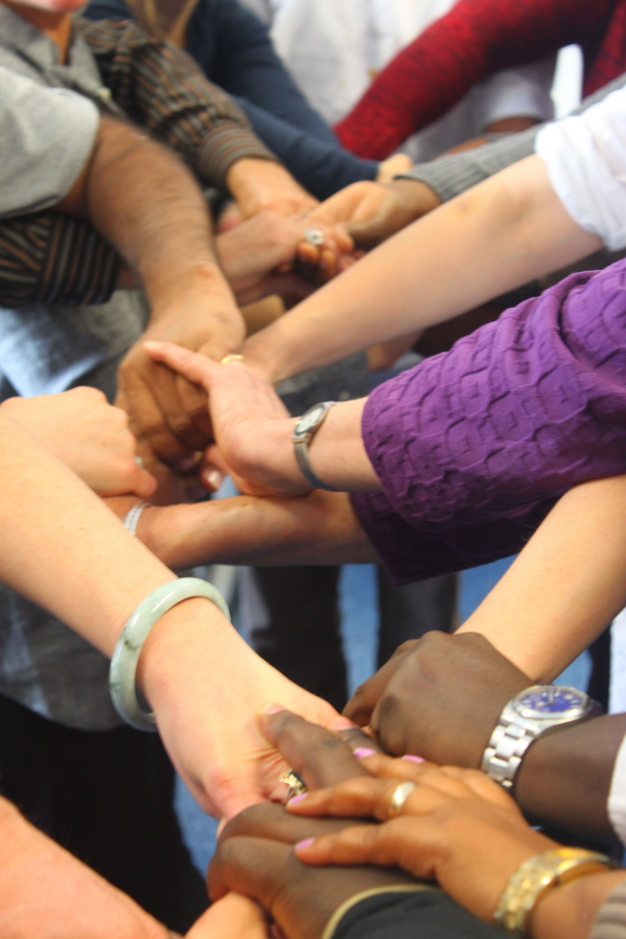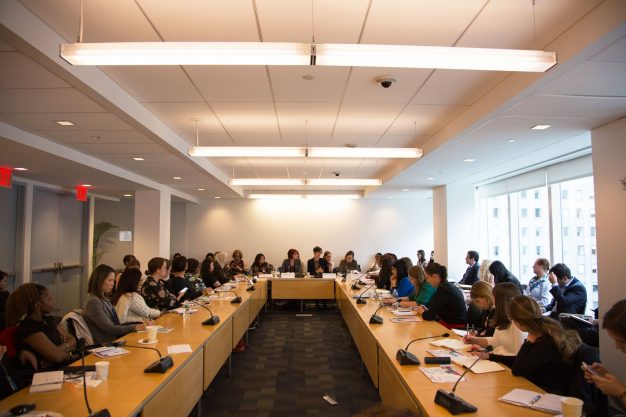
During the 16 Days Campaign WPP will be releasing articles from its Publication “Women, Peace & Security: Business as Usual?”. Each year, WPP produces a thematic publication, on critical issues affecting the realities of peacebuilding on the ground. This year, our publication will be a critical exploration of the relationship between the private sector and the implementation of the Women, Peace & Security agenda. WPP has chosen to link this publication to the 16 Days Campaign, as this campaign aims to create awareness and action around the connections between militarism, power and patriarchy.
Day 16: "Shrinking Space: The Impact of Counterterrorism Measures on the Women, Peace and Security Agenda"
By Isabelle Geuskens
In this article Isabelle Geuskens, WPP Executive Director, explores the direct and indirect effects of counterterrorism measures (CTM) on the implementation of the Women, Peace and Security agenda. It expands on the previous article by the same name released on May 24, 2015, and now also looks at the important and often overlooked role of the private sector in the enforcement of CTM. With examples from the field, Isabelle illustrates the gendered impact of CTM on women’s organizations working for peace.
Day 14: "The Post-2015 Agenda and Corporate Sector Involvement: The Need for Transparency and Transformation"
By Thalia Malmberg
In this article Thalia Malmberg, WPP Program Officer, critically explores the role of the corporate sector in the development and implementation of the Post-2015 Development Agenda. She argues for an approach that prioritizes adherence to human rights over profit, and that holds those in positions of power accountable.
Day 13: "Disarming through Divestment"
By Suzanne Oosterwijk and Susi Snyder
Suzanne Oosterwijk and Susi Snyder from PAX write about divestment as a tool to end nuclear weapons or cluster munitions. They argue a coordinated global effort for divestment from producers of these weapons can help halt their production, development, and modernization.
Day 12: "War Profiteers Prefer to Hide in the Shadows"
By Andrew Dey
In this article Andrew Dey, Nonviolence Program Worker at War Resisters' International, analyzes the gendered causes and impacts of the war industry. He argues that we can challenge the underlying structures of war by challenging war profiteers: the industries that both profit and support ongoing cycles of war and violence.
Day 11: "The Challenges for Women Defenders Working on Business and Human Rights"
By Alejandra Ancheita
Alejandra Ancheita, Founder and Executive Director of ProDESC, gives an insight in the heightened risks for women human rights defenders when dealing with businesses. She elaborates on the gendered shortcomings of existing protection mechanisms, leaving women human rights defenders worldwide vulnerable to gender-specific threats and aggressions. From her personal experience in Mexico, she gives recommendations for an adequate national and international response for protecting women human rights defenders facing threats and aggression by businesses.
Day 10: "Women Lead The Struggle to Defend their Land, Lives and Communities in The Philippines"
by Semanur Karaman
Mindanao, the second largest and southernmost major island of the Philippines, rich in natural resources and minerals, is being plundered by trans- and multi-national companies carrying out extractive operations with impunity for the human rights violations they commit. In this article Semanur Karaman of AWID interviews Cristina Palabay of Karapatan on how the women of the Mindanao are taking matters into their own hands and leading the struggle to defend their communities.
Day 9: "Don’t Trust, Don’t Fear, Don’t Beg: A Feminist Analysis of TTIP"
by Merle Gosewinkel
In this article, Merle Gosewinkel, WPP Senior Program Officer, conducts a (so-far largely absent) gender-based analysis of Transatlantic Trade and Investment Partnership's (TTIP) possible effects, including the possible danger the trade agreement could mean for sustainable peace. Citing expert sources from academia and civil society, she argues for a feminist perspective into economics that looks at development in a more holistic way, as opposed to the current narrow frame of growth and markets.
Day 8: "The Unrecognized Economic Role of Women during and after Conflict"
by Tamara Kool
In this article, Tamara Kool, a PhD fellow in Economics and Governance at Maastricht University and UNU- MERIT, discusses the often overlooked economic role of women during and after conflict. She looks into factors enhancing and obstructing economic participation by, women, and makes an argument for why we must consider them when we talk about Women, Peace and Security.
Day 7: "What’s Sexual Violence Got To Do with the Economy? The Case of the DRC"
by Serena Cruz & Helen Hintjens
In this paper, Serena Cruz and Helen Hintjens propose that in the Democratic Republic of Congo the unholy alliance of economic interests, forced labour, sexual predation, and killings that King Leopold of Belgium established from 1884 onwards resulted in structures of predatory, violence-based capital accumulation that persist today. They discuss how this influences the lives of women on the ground, as well as the ways that the status quo is being challenged.
Day 6: "Women's Role in the Rancho Grande Resistance: Facing Patriarchy In- and Outside"
by Teresa Perez González
In this article, Teresa Perez González brings you the story of the women active within the anti-mining movement in Rancho Grande, Nicaragua. From her analysis, we learn that women face multiple levels of patriarchy affecting their activism, both within the extractivist industry, as well as within the nonviolent movement. It's a story about the power of nonviolent mobilizing and women's perseverance.
Day 5: "Undermining Extractive Mining: Cases of Women's Activism in Latin America"
by Rita Hershkovich and Sophie Schellens
In this article, Rita Hershkovich and Sophie Schellens apply a feminist analysis to the extractive mining industry in Latin America, and discuss how this deeply patriarchal industry is affecting women on the ground. Using inspiring stories of women at the forefront of nonviolent activism against extractive mining practices, this article shines a light on the creativity, ingenuity and persistence of women activists in Latin America.
Day 4: "Servicing Extractivism?"
by Sophie Toupin
In this article, Sophie Toupin reflects on the linkages between Social Corporate Responsibility (CSR), extractivism and the policies of the Canadian government in regards to non-governmental organizations. The article focuses on how many nonviolent movements, lead by women, are emerging in Canada, which stand up against the colonizing politics, demanding a transformative approach to safeguard peace and an environment for future generations that will not to be spoiled under the guise of economic development.
Day 3: "(Big) Business, Women and Security: Profiting from a Healthy Skepticism"
by Shyamika Jayasundara-Smits
In this paper, Shyamika Jayasundara-Smits, research fellow at the Erasmus University (Rotterdam), outlines recent developments in the nexus where the private sector, women, and security meet and how these three themes are discussed in the sustainable development, post-conflict reconstruction, and state-building debates. Drawing on insights from a range of literature the paper contributes to understanding the role big businesses play in realizing or undermining women’s decades-old, nonviolent struggle for security and political and economic rights.
Day 2: "Threats Will Not Disappear with Silence: Challenging Corporate Actors to Speak Out for and Support Women Human Rights Defenders"
by Sarah Brooks
In this article, Sarah Brooks, the Women Human Rights Defenders Focal Point for theInternational Service for Human Rights (ISHR), explores the role of corporate actors in conflict and gives suggestions for a way forward that state and non-state actors can contribute to an enabling environment for peace.
Day 1: "Profits of Pain: Stopping the War Economy to Stop Wars"
by Ray Acheson
In this article for WPP, Ray Acheson, Director of Reaching Critical Will, discusses the roots of the war economy, and how many private companies are profiting from conflict. She analyses these practices from a gender perspective, looking at how they impact the lives of women on the ground, and what the implications are for the Women, Peace and Security Agenda. Acheson then lays out six concrete strategies for change.
12 Dec '17 Today, we are pleased to share with you the Conference Report “Financial Inclusion for Freedom and Security” by the Women Peacemakers Program, Duke Law International Human Rights Clinic, Human Security Collective, Transnational Institute, the Charity & Security Network, in cooperation with the Knowledge Platform Security and Rule of Law.

7 Dec '17 Today, on the 13th day of the 16 Days of Activism Against Gender Violence Campaign, we bring you the sad news that from 15 December onwards, the Women Peacemakers Program (WPP) will have to close its doors. We would like to ask for your time to read what has driven us to make this decision.

7 Nov '17 On Thursday, 26 October 2017, a side event entitled, “Pulling the Rug from Under Our Feet: What is the UNSCR 1325 Without Civil Society Freedoms?” was hosted on the margins of the 17th anniversary of United Nations Security Council Resolution (UNSCR) 1325. The event was hosted by the Women Peacemakers Program (WPP) and the Dutch Mission, in collaboration with Duke Law’s International Human Rights Clinic, Al-Hayat Center for Civil Society Development, Arab Women Organisation of Jordan, NOVACT, Free Sight Association, Iraqi Al-Amal Association, Women Empowerment Organisation, NGO Working Group on Women, Peace and Security and Women’s International League for Peace and Freedom. This article briefly looks at the main issues discussed during the event.
